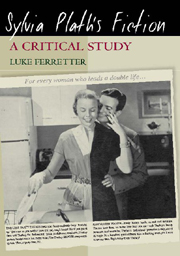4 - Gender and Society in The Bell Jar
Published online by Cambridge University Press: 12 September 2012
Summary
‘We're stargazers this season, bewitched by an atmosphere of evening blue’. Thus begins the text Plath wrote for ‘Mademoiselle's Last Word on College’, the summary of the work she and her fellow guest editors had done on Mademoiselle's 1953 College Edition. The text goes on, in the characteristic extended metaphor of the fashion blurb, to speak about what the editors see in the ‘fashion constellation’, the ‘astronomic versatility’ of sweaters, and to praise Mademoiselle as the ‘star of the campus’. It appears beneath a photograph of the twenty guest editors dressed in the fashions to which the text refers, standing in the shape of a star, with Plath herself at the top. The page embodies Plath's complex relationship to the gender discourses in which she grew up, showing that she could write fluently, indeed appear with her entire person, in precisely the kind of discourse against which her work is also a protest. The College Board Contest, the competition Plath won in order to become a guest editor, was advertised the year she entered as ‘a step ahead on a career’, ‘a trail blazer for the future’ and ‘real brain work’. The twenty guest editors, in the issue on which Plath worked, were said to be ‘the best, the very best’ of college students from across the country. Nonetheless, the crowning achievement of this elite contest is the kind of vacuous fashion blurb, ‘silver and full of nothing’, as Plath put it in The Bell Jar (BJ 95), that she wrote for the ‘Last Word on College’.
- Type
- Chapter
- Information
- Sylvia Plath's FictionA Critical Study, pp. 116 - 151Publisher: Edinburgh University PressPrint publication year: 2010



